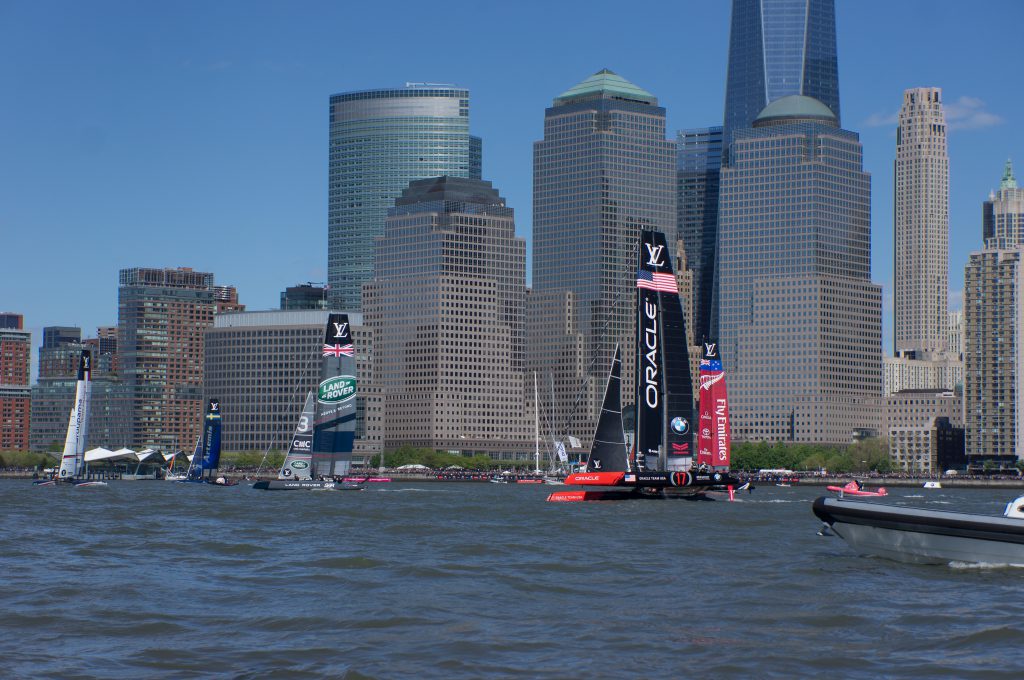Talents and teamwork are key in sailing and in the workplace. Over the last weeks New York has been spoiled with some great sailing events.
There was the America’s Cup World Series, which returned to New York for the first time in almost a century. Racing for this iconic Trophy was held off New York from 1870 to 1920 for the first 13 challenges – with this, the America’s Cup is the oldest Trophy in international sport. In May/June 2017, the next America’s Cup race will take place in Bermuda, but the World series races in New York leading up to this epic race already attracted a crowd of over 100.000 sailing enthusiasts. I was lucky to be able to watch the race from the deck of Freedom, the 12 meter yacht who defended the 1980 America’s Cup, thanks to an initiative of the Brooklyn Bridge Sailing Club.
The boats have evolved a lot over the last 150 years. The classic yachts have made way for foiling catamarans. Part of this break-through innovation is because this is the only race where the winner can set the rules for the next race. With that, the focus has shifted from long term team strategy to more short term, tactical thinking and fast action. This has made it more into a spectacle sport which has upset some sailors, but on the other hand makes sailing more known to the public, which will ultimately make the sport more accessible as well. Not everything has changed though. Throughout the history of the America’s cup, it were always the industry captains who were promoting the sport, from a Vanderbilt in the 30’s to Larry Ellison from the Oracle team now.

More importantly, the constant through all of these races, is the importance of teamwork. Even if you have the world class sailor on your team, that alone will not help you much if the rest of the team is not performing or not communicating well. A team is only as strong as the weakest link, that is true for sailing as well as in the corporate world.
A very different kind of race is the Transat Bakerly, an east-to-west single-handed yacht race across the Atlantic from Plymouth, UK to Brooklyn, NY and a preparation for the Vendée Globe, a round- the-world single-handed race. Here, the sailors’ individual endurance is tested by strong winds (the race is mostly upwind), towering Atlantic waves and the potential of fog or drifting Arctic ice. While they are on their own for often over 10 days at sea, each skipper is supported by a team of 8-10 people who are expert technicians on the boat and make sure everything runs smooth in preparation of the solo voyage. So teamwork is key here as well. I heard stories of a water-maker breaking down in the middle of the ocean, where there is no option for rescue. In those critical moments, the ability of the support team to talk the skipper through reparations and coach him to keep his head cool, is a matter of life and death.

Where The America’s Cup is fast and flashy, like a sprinter, the Transat and Vendée Globe are slower, quieter and comparable to an endurance runner. Still, both rely on excellent teamwork and communications and on the right combination of talents to make the race a success. Even if one talent such as leadership from the skipper, gets more time in the spotlight, no skipper can win without the whole team performing well.
The same is true for the corporate world. Everybody has their own core talents and the right mix of core talents is important for the success of the company. At Hercules Academy, we often are engaged by companies to discover the core talents of their team through a CoreTalents® assessment. While the results are very valuable at the individual level, we always encourage companies to look at the team level to see if it is a well-balanced team and if all required talents are present based on the mission of the team. Many of our clients even ask us to make a core talents inventory across the functional divisions of their organization so that they can choose the optimal team for project based on the right combination of talents to have maximum chance of success.
Next to the right mix of talents and teamwork, keeping up the motivation and energy levels are important as well as fatigue can be fatal. So the skippers will need to take care of their body as well by resting, staying hydrated and taking care of their nutrition. Again, a parallel can be drawn to the corporate world. Though their is no immediate lethal danger lurking around the corner, fatigue and low energy levels lead to low productivity and can result in a burn-out.
On Sunday, May 29th, many of the same boats that arrived here only a week ago from Plymouth left New York for the Transat NY-Vendée for over 3000 miles of solo sailing. I watched them leave the port, in awe at their courage, their sense of adventure and the way they trust their team, themselves and their instincts, having no choice but to deal with the challenges nature will give them.
For me, there was nothing left but to wish them “Fair winds and following seas”.
